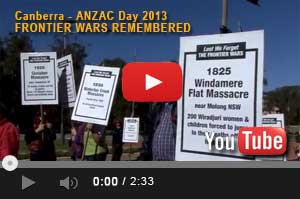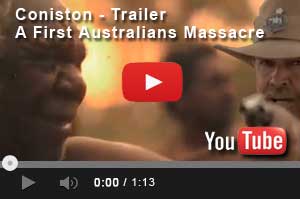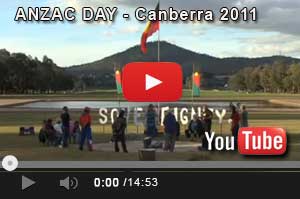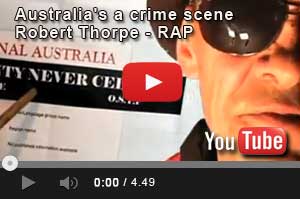'The Forgotten War' - slaughter on stolen lands
 Australia's forgotten war - New Book by Henry Reynolds
Australia's forgotten war - New Book by Henry Reynolds
By any objective consideration, this was Australia's long war - the bitter, dis-remembered struggle at its very national foundations; and, for Aborigines, their great war.
Raymond Evans The Age 10 August 2013
While we remember our casualties in overseas wars, no toll exists for Aboriginal deaths during the brutal colonisation of Australia.
As with so many other Australian urban centres, in the Queensland coastal town of Bundaberg the statue of a Great War Digger gazes down from its high, imposing column. The commemorative monument rises out of a well-mown roundabout in the heart of Bundaberg's main thoroughfare, Bourbong Street.
Its centrality reflects a fervent, everyday preoccupation with warfare and soldiering in the national lexicon. Twentieth-century Australia, as Henry Reynolds reminds us in this challenging and cogently argued volume, has been "almost continuously" engaged in foreign wars, at the behest of the British or American hegemon, since 1939.
This is an important and richly textured book - one that deserves wide reading and debate.
The Bourbong Street memorial is the only public nod to Australian history you will see along this busy thoroughfare. Yet the street's name, as frontier historian Robert Orsted-Jensen points out, carries a hidden historical charge that takes us back to a much earlier and far more intimate conflict. It is a charge that is also calculated to set us back on our heels.
For in January 1895 Nicholas Tooth, one of the first pastoralists in the district and a conservative member of parliament in Queensland, pointed out to readers of the Bundaberg Mail the derivation of the word "Bourbong". It was a corruption of the Gurang Gurang word "Bier-rabong", he wrote, meaning "plenty dead".
In the 1860s, Tooth recalled, "where North Bundaberg now is, the blacks called Bier-abong; neither for love nor money could we ever get any blacks to go near the place ... it was mere chance that revealed the cause."
Tooth and his companions, while scouring through the bush for ebony wood to make stockwhip handles, had stumbled upon "a heap of human bones, among which were 15 to 20 skulls ... [I]t was the spot where the Native Police had come upon a large camp of blacks and dispersed them."
So, if the witness of one of Bundaberg's founding fathers is to be accepted, Bourbong Street is a paradox. On the one hand, it has inadvertently been named after, and probably runs along its present course not far from, one of the many colonial sites of frontier violence. It recalls an event that no one now remembers and many would be quick to deny occurred.

Henry Reynolds | 256 pages | ISBN 1742233929
On the other hand, it hosts the revered statue of a generic Anzac as a daily reminder of something we are continually told we should never forget: Australia's long and celebrated history of military involvement and sacrifice. Ritual remembrance beside long-standing forgetfulness: "Lest we forget" rubbing shoulders with "Why don't they just get over it?"
It is the kind of paradox that Reynolds gamely wrestles with throughout this closely argued account. For the past 40 years, in a succession of such volumes, he has continued to wrestle with it, approaching it from those two peripheries of the Australian imagination, Queensland and Tasmania, and coming closer and closer each time to pinning it to the mat. Patiently, and with admirable, indomitable energy, he keeps informing the Australian public of things they need to know, but which many of them do not wish to hear.
What he is now basically saying is: Forget the so-called history wars. They represent a hollow, media-driven campaign to deny the undeniable. Focus instead on the war for Australia: that is, the extended and bloody destruction of Aboriginal first nations across almost 150 years of frontier strife - the utter territorial dispossession of perhaps as many as 1 million people, and a unilateral assumption of their sovereignty, accomplished with swaths of escalating violence.
This was, as Reynolds writes, "one of the greatest appropriations of land in world history", unmatched elsewhere in speed and scale. It is the basis of every leaven of prosperity in Australia today. An accompanying "progressive transfer of sovereignty" was equally a blatant "transaction of global significance".
It was "a double usurpation" of both the right to exercise authority over one's territory and of customary title to land. What was done here, in short, was anomalous and "manifestly not consonant with international law or the practice of nations at the time". It was, Reynolds claims, "an outrage, a violation of international usage, the assertion of a monstrous principle".
No wonder, then, that it led dually to such degrees of violence and cover-up. Violence, both invasive and resistant, as thousands of "aggressive, well-armed" settlers advanced confidently into what British authorities assured them was "vacant land", legitimately there for the taking, and thousands of resident Aborigines fought in defence of their traditional territories, as close to their beings as a blood-bond. Cover-up proceeded apace alongside this, later outstripping it, as the violence was increasingly realised to have been both excessive and shameful.
By any objective consideration, this was Australia's long war - the bitter, dis-remembered struggle at its very national foundations; and, for Aborigines, their great war. Most of the engaging colonists knew this at the time. The resistant, conquered Aborigines even more intimately knew it, too. Furthermore, they have never forgotten.
And, though the Australian War Memorial still demurs, most military historians now concur with Australia's embattled race-conflict historians on the point. It was clearly our longest and most irregular war. Its combined casualties probably rival those of Australia during World War II and vastly outnumber those of the smaller wars we have fought in Africa, Asia and the Middle East. It is arguably our most consequential war and perhaps, ultimately, our most costly, controversial and heartbreaking conflict of all.
This is an important and richly textured book - one that deserves wide reading and debate. It is probably the most impressive and instructive book that Reynolds has written since his ground-breaking volume, The Other Side of the Frontier, in 1981.
It is, perhaps, more impressive than that first iconoclastic foray, for it distils so many more years of forensic research and deep thinking into this corrosive topic. In terse, uncompromising sentences, Reynolds lays out a new road map towards true reconciliation.
FORGOTTEN WAR
Henry Reynolds
NewSouth, 280pp, $29.99
 Lest We Forget the warriors who fell in 'The Frontier War' conflicts
Lest We Forget the warriors who fell in 'The Frontier War' conflicts





